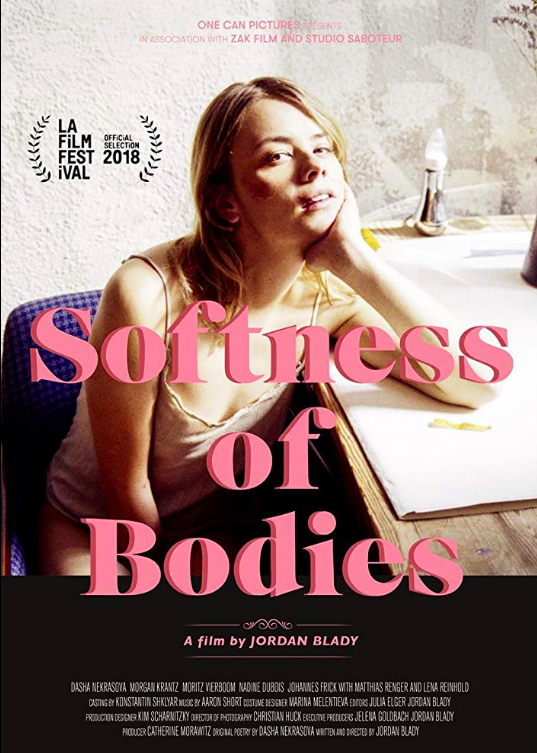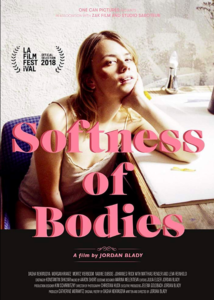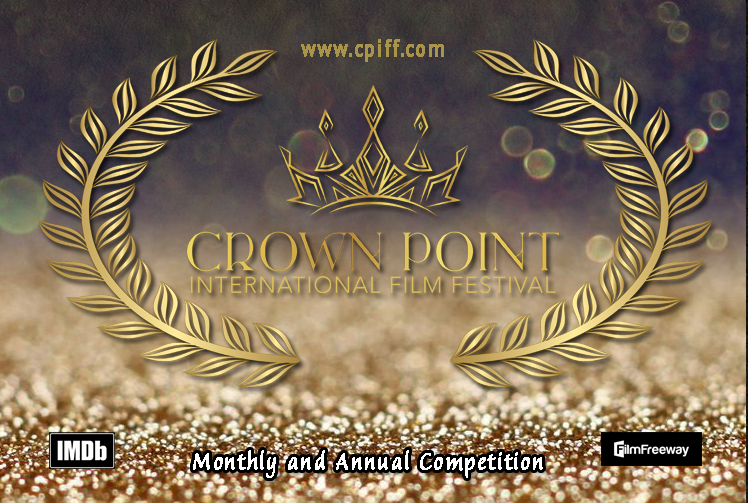
Indie Film Review “Softness of Bodies”
WATCH THE TRAILER HERE
First, the Recap:
Stark naked. It’s one of those feelings that is actually not so comfortable when applied to notions beyond physical intimacy. Rather, when considered under the banner of our own insecurities and ever-present faults, in view of skewed perspectives of our self worth, being fully exposed to the elements of life around is numbing and annoying. Yet in this state of unsettled emotional nudeness, do we forget therefore to realize how our actions impact those closest to us? For Charlotte (Dasha Nekrasova), a young woman in Berlin on a one year artist visa, life has been less than copacetic or ideal, therefore naturally feeding into the erratic proclivities she finds herself immersed in while striving for a coveted poetry grant.
Attempting to discover who she really is and have any semblance of real self esteem, Charlotte engages in the few social interactions she seems to relish–kleptomania and an on-again/off-again “relationship” with Franz (Moritz Vierboom), who has his own issues with commitment involving another woman named Marianne (Lena Reinhold). Working a menial job at a local café, spending time with her actual flat mate/best friend/confidant Remo (Johannes Frick), and loathing a fellow poetry grant finalist Sylvie (Nadine Dubois), Charlotte’s existence only gets more convoluted by the arrival of a former flame from L.A., Oliver (Morgan Krantz), who pushes to reconnect. Yet with anything positive that comes along, events always seem to take decidedly negative turns, and soon Charlotte’s spiral of uncertainties and eccentricities begin to take their toll on her, but even more so on anyone around her.
Next, my Mind:
It’s no understatement to say that this 73-minute indie film effort, marking the feature-length debut of writer/director Jordan Blady, boldly and unapologetically takes on a myriad of raw, distinctly cynical, darkly humorous, painfully honest interpretations of what it is to be human and executes an ultimately affecting drama that likewise chooses to pull no punches in showcasing how many of our choices, when made out of desperation, boredom, ignorance, or melancholic hazes, can not only drag us down crooked paths, but take others around us plummeting as well. What makes this concept even more potent and, frankly, disturbing here is that we are often so intensely blinded by our own sense of self preservation, we don’t digest the fact that we’ve so overtly caused pain, inconvenience, or other troubles to these people we claim to care about. Instead, it’s an almost parasitic connection being pursued, using people to satisfy our immediate need for a “fix” (drugs, booze, sex, a shoulder to cry on), even if out of the “good intentions” we would wish to claim, without any rumination of exactly what effect it has had, even to the extent of watching the consequences and ripples of these manipulations flow out in front of us and choosing to just “play dumb” and move on in spite of it all.
How this all is portrayed through the eyes and activities of one distinctively disconnected young woman is intelligently displayed, firmly grounded, and, dare we say, terrifyingly real in its transparency, very much being an overall reflection of the prevailing attitudes that this world seems to embrace more and more currently. It’s sad to say that, but equally sad is that it is true when we look around, and even within ourselves, and can notice how our searches for that meaning, purpose, and solid course ends up in temporary, not-so-fulfilling fixes as opposed to genuine commitments. Once this cycle of mistakes occurs, are we doomed to repeat them when its our base urges that dictate our decisions rather than much more level-headed thought processes? It’s all explored here with impactful and weighty tone, delivering a finale that left this critic somewhat shell-shocked, as its effective mix of conjecture and blatant “did all that really just happen??” hit me quite hard, especially given the context of all that had transpired and how it wrapped up for Charlotte. Visually the film carries a high amount of starkness to it, which more than befits the grander, underlying tone throughout when addressing the themes and cultural/societal anarchy depicted through Charlotte’s journey. There’s the requisite crude language and several moments of sexuality/nudity I could have done without personally, though admittedly in the framework of the film and the lead character’s plights, it did actually fit.
Playing this style of character, at least to this critic, cannot necessarily be an easy thing when having to portray such a heavy sense of hopelessness while yet making the viewer believe the character DOES have a shot at redemption, and Nekrasova does a splendid job giving us exactly that in her role as Charlotte, a woman we can tell has dreams and aspirations, but soon shows that because of her own shortcomings, reaching them may cost her, and several others, a lot. Choosing to live in Berlin for a year on an artist visa to pursue a poetry grant, Charlotte has “settled” into a frenetic and haphazard state of being filled with much that is fleeting or ill-advised overall, all while striving to maintain enough of a grasp on actuality to gain what she hopes will be her ticket to better things. Emotionally fragile, her roads seem to end up encountering all the bumps and pitfalls she’s allowed to become a part of who she is. Thinking there’s no way out, every moment of hope gets dashed, and even when finally attaining the first step towards what she, and we, hope is betterment, it’s still marred by events that have damaged her further. Yet, her vulnerability and ingrained determination to buck societal expectations, carve her own niche in the world, and just be who she is constantly shines forth, good or ill results of choices in tow, and by the end of our excursions with her, it’s still hard to know whether to root for her or not strangely enough. Watch and you’ll see. But, regardless of what your opinion is, one thing is for certain, Nekrasova brings an acute passion, vigor, toughness, and relatable air to her performance that is very, very noteworthy and astute.
Primary supporting roles begin with Vierboom as Charlotte’s ill-advised “man of the hour” Franz, a regular guy with plenty of baggage when it comes to his own battles with committed relationships, yet keeps yearning to be with Charlotte despite having an actual girlfriend already. How Charlotte seems to pull him along is heartbreaking on one level, yet knowing what we know about him, we don’t really feel sorry for him, at least perhaps until he truly becomes a victim of Charlotte’s missteps. Secondly is Krantz as Charlotte’s ex from the U.S., Oliver, who comes to Berlin for a photography job and to, he hopes, rekindle the old flame. His presence is a minor annoyance to her, though he persists, yet ends up involved with a completely different–situation–that puts a dagger in things. Thirdly there is Frick as Remo, Charlotte’s flamboyant flat mate and somewhat involuntary confidant who tries his level best to keep Charlotte in check, even while he has pursuits of his own to concern himself with. His evident frustration with her shenanigans is matched only by the genuineness of concern towards her as a friend. Next there is Dubois as the appropriately snobby Sylvie, Charlotte’s primary competition for the poetry grant they’re both after with a vengeance, and whose interactions with Charlotte are actually quite witty in their subtle (or not so subtle) venom-filled tone and intent. Finally there is Reinhold as Franz’ real issue, Marianne, who’s most likely the entire reason he’s even able to afford life as he knows it, yet still chooses to two-time. She has plenty to say about it, enforces that with Charlotte, but then takes an unexpected turn with her that is assuredly jarring. Truly, each and every one of these actors embodies their characters with poise and solidly executed performances.
Additional turns arrive from a myriad of other actors, including Matthias Renger, Telmo Branco, and Alexander Tschernek among others. In total, including the fact that Nekrasova wrote original poetry for this film, “Softness of Bodies” could simply be seen as a straightforward, albeit dark, dramedy and that’s that. But, for this critic anyway, it goes beyond that in its utilization of flawed characters living flawed lives who experience glimpses of joy or hope to illustrate the realities of this legitimately flawed world we’re in so as to perhaps be the reminder that the ramifications of poor choices can have lasting, unfortunately negative, effects on others. Ignoring it can possibly deter our own attempts at finding success, even if on the surface it all looks rosy. In the end, we need to be willing to recognize and take responsibility for said actions while also trying to be mindful of the other “soft bodies” around us, rather than thinking it’s all just about “number one”. Otherwise, the prices paid by others and ourselves might just end up being too high, whether experienced immediately or down the road.




